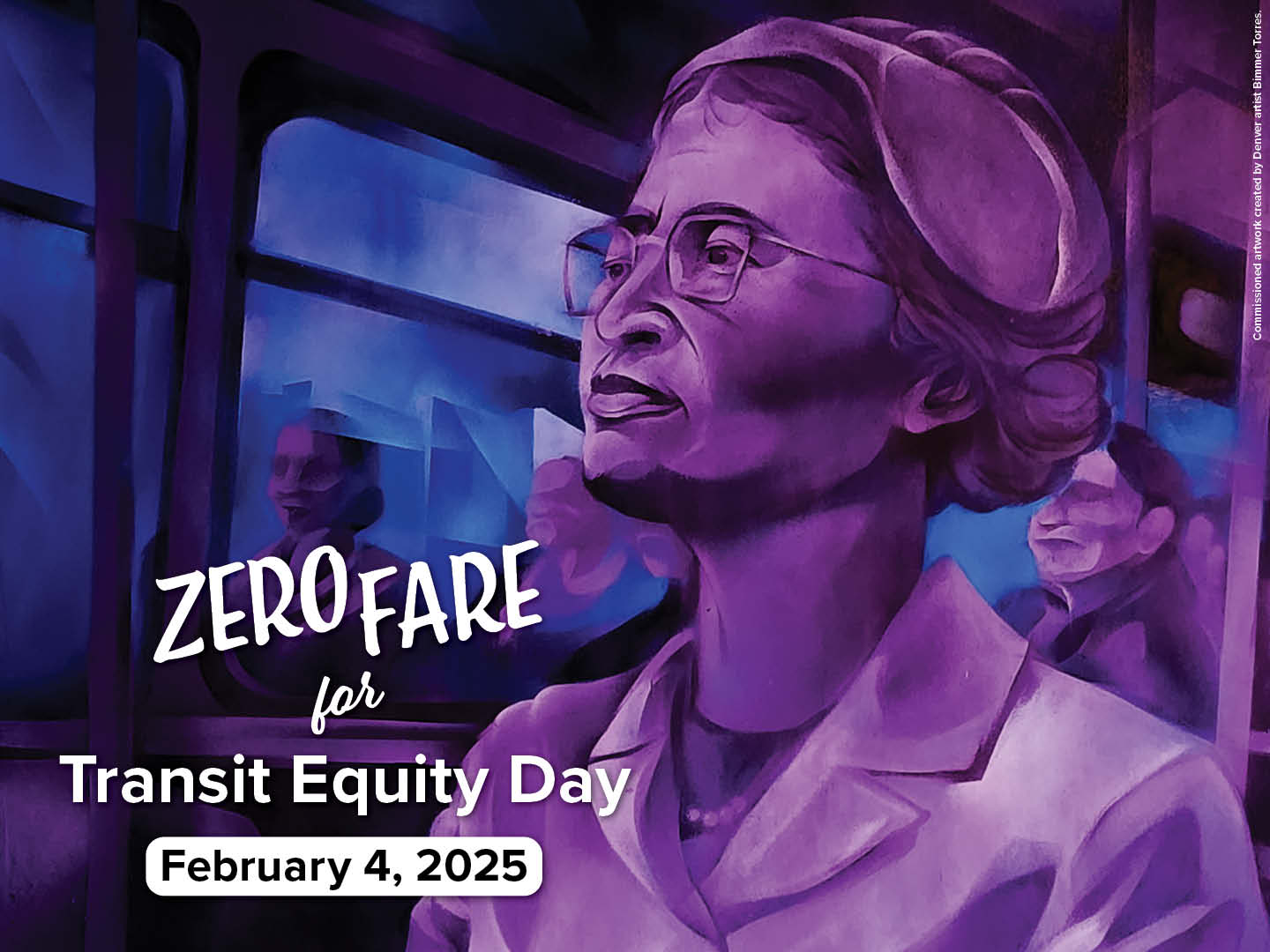
Honoring Rosa Parks: Celebrate Transit Equity Day with zero fare
by Gisa Simmons, Specialist, Civil Rights OutreachDiversity Spotlight celebrates the diversity of RTD employees and the larger community that RTD serves and fosters an appreciation of our social and cultural similarities and differences. Diversity Spotlight supports RTD’s values of passion, respect, diversity, trustworthiness, collaboration and ownership.
Zero Fare for Transit Equity Day, a transformative initiative adopted by the RTD Board of Directors on Dec. 3, 2024, commemorates the birthday of Rosa Parks on Feb. 4. This day not only celebrates Parks' birth but also her courageous act of defiance, which emphasized the critical ongoing need for equity in public transportation, a movement that Parks’ actions helped spur more than 60 years ago.
Background on Rosa Parks and the Montgomery Bus Boycott
Rosa Parks, born on Feb. 4, 1913, in Tuskegee, Alabama, is widely celebrated as a key figure in the Civil Rights Movement. Her act of resistance on Dec. 1, 1955, in Montgomery, Alabama, is one of the most well-known moments in the struggle for racial justice in the United States. Parks, a Black woman, refused to give up her seat to a white man on a segregated bus, a violation of Montgomery’s segregation laws that mandated Black passengers sit in the back and yield their seats to white passengers. Her arrest for this simple but powerful act of defiance sparked the Montgomery Bus Boycott, a pivotal event that would help shape the Civil Rights Movement.
The Montgomery Bus Boycott, which lasted 381 days, was a peaceful protest led by Dr. Martin Luther King Jr.and other community leaders. It was one of the first mass movements to challenge racial segregation and brought national attention to the systemic inequalities faced by Black Americans, particularly in public spaces. The success of the boycott eventually led to the Supreme Court’s ruling in Browder v. Gayle that declared segregation on buses unconstitutional.
Rosa Parks’ courageous stand against segregation made her a symbol of the fight for civil rights. She went on to receive numerous awards and honors for her contributions to the movement, including the Presidential Medal of Freedom in 1996. Parks’ legacy, however, is not solely defined by this singular act of resistance; it is also defined by her lifelong advocacy for justice and equality, particularly for underserved communities.
The National Transit Equity Day Movement
In honor of Parks' legacy and the ongoing struggle for equal rights, Transit Equity Day was first celebrated federally by the U.S. Department of Transportation in 2021. The initiative serves to recognize the essential role public transit plays in providing access to opportunities, social mobility and justice for all, particularly for communities that have historically been underserved. Transit Equity Day also honors the principle that public transportation is a civil right. Just as Parks’ refusal to move to the back of the bus highlighted the injustices embedded in segregation, Transit Equity Day calls attention to the importance of equitable access to transportation, which remains a crucial issue for many communities across the country. The day serves as a reminder that public transportation is more than a service — it's a vital tool for social inclusion and a means of connecting individuals to jobs, education, healthcare and more.
The day has gained national traction, with more than 15 public transit agencies participating across the United States in 2023. The goal is to foster greater awareness of the connection between public transit and civil rights, as well as to advocate for greater equity in transportation policies and services.
RTD’s Inaugural Zero Fare for Transit Equity Day
In 2025, RTD will hold its inaugural Zero Fare for Transit Equity Day, during which the agency will offer no-cost fares to all customers throughout the day, making public transit accessible to everyone and reinforcing the idea that transit should be available to all, regardless of income or background. This powerful gesture symbolizes the importance of public transit as a tool for social justice and inclusion. It is a direct acknowledgment of the role that public transportation played in the broader struggle for civil rights and a reflection of RTD’s commitment to advancing equity in every aspect of its services.
Zero Fare for Transit Equity Day
Take action and be part of history! Join RTD at 11 a.m. Feb. 3 at City Park, in front of the “I Have a Dream” memorial statue as RTD General Manager and CEO Debra A. Johnson and other local leaders kick off the holiday with a special news conference to remind customers that Zero Fare for Transit Equity Day is on Feb. 4. Together, we will honor Rosa Parks’ legacy and continue the vital work of making public transit accessible, equitable and inclusive for all. Don’t miss this opportunity to advance transit equity.
Reflecting on the Legacy and Continuing the Work
RTD invites all community members to join in honoring Parks' legacy and reflecting on the broader movement for civil rights. Transit Equity Day is a call to action, reminding us of the work that remains to ensure that everyone — regardless of their race, color, national origin, ethnicity, gender identity or expression, disability, sexual orientation or socioeconomic status — has equal access to public transportation.
As we celebrate the legacy of Rosa Parks and the Montgomery Bus Boycott, let us also take this opportunity to reflect on the progress made and the challenges that remain. Access to reliable and affordable public transit is still a major issue for many Americans, and Transit Equity Day serves as a reminder that we must continue to work toward a future where all individuals have equal access to the opportunities they need to thrive.
Diversity Spotlight recognizes special observances as set forth by presidential proclamation, executive order and public law, and in keeping with RTD’s commitment to diversity, equity, inclusion and belonging. Please note that participation in these activities is voluntary and unpaid. Supervisor approval is required to participate if events occur during a regularly scheduled shift.